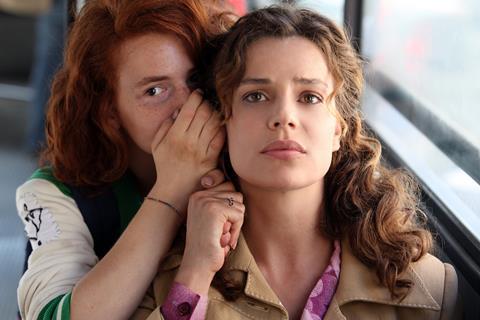Dir: Sebastiano Riso. Italy 2014. 94mins

There’s no doubting the bravery of Davide, the androgynous 14-year-old Sicilian boy whose story forms the centrepiece of Sebastiano Riso’s debut. Based on the true early life story of a leading Italian drag queen – a connection that in this final edit is alluded to only in one blink-and-you-miss-it final credit sequence – the film charts the conflicted teen’s discovery, in downtown Catania, of a supportive alternative family of gender-flexible chancers, hustlers and performers, when he runs away from his repressive Catholic home.
The film will rouse some audience interest at home in Italy, where the debate on freedom of sexual and gender expression still has some ground to cover, and will likely be stirred, rather than patronised, by Midnight’s soft-shoe approach and simplistic ‘prejudice is bad’ message.
If only the script and direction had the same sense of purpose. In a film that doesn’t want its hero, or audience, to suffer too much, and goes easy even on a paedophile pimp, Darker Than Midnight (Piu buio di mezzanotte) comes across as an early Gus Van Sant film sanitised for a young teen audience. It’s also surprisingly flatline in dramatic terms, given the material.
Released by Cinecitta Luce on May 15, after its Cannes Critics’ Week debut, the film will nevertheless rouse some audience interest at home in Italy, where the debate on freedom of sexual and gender expression still has some ground to cover, and will likely be stirred, rather than patronised, by Midnight’s soft-shoe approach and simplistic ‘prejudice is bad’ message. Elsewhere, this is not likely to set the pulse racing, despite the admittedly striking poster image of flame-haired lead Davide Capone, who has one of those borderline boy-girl faces that compel the attention.
But looking and expressing are two different things, and behind the camera, Capone’s performance lacks the spark that we feel a kid who made the conscious decision to abandon his family home aged 14 must have possessed. At first his passivity is interesting: there’s a quiet determination behind his shy suppression of emotion, and we follow intrigued as the roving camera tracks Davide’s lonely exploration of a city park (Villa Bellini in Catania), takes him to a porn theatre where he runs the gauntlet of dirty old men wanting to ‘daddy’ him.
Here he meets up with La Rettore (Gulizia), a Depeche-Modish fellow androgyne who introduces Davide to his variegated group of friends – including a poor-man’s-Marilyn-Monroe transvestite hooker (Gimelli Morosini in one of the film’s more committed performances).
A gang-of-friends support network is duly formed, while a series of flashbacks fills in Davide’s family backstory, showing him to be the victim of an authoritarian father (Amato), a conformist enraged by his long-haired, effeminate son’s ‘shameful’ failure to be a good, skirt-chasing Italian son, and a fragile mother – both derivative characters, both paying lip service to the orthodoxy that hey, in the end, everyone’s a victim.
When Davide falls for a moody local rent-boy (Raineri), he comes into contact with the latter’s pimp (Delbono), a white-suited melancholic whose entirely consensual ‘rape’ of Davide is an excuse for the camera to pan pruriently around the room. The fact that Davide’s father also wears a white suit in one key scene is presumably supposed to make us reflect, in pop-Freudian fashion, on how repressive, homophobic fathers are also kind of pimps in their way.
Production companies: ideaCinema, RaiCinema
International sales: RaiTrade, www.raitrade.com
Producer: Claudio Saraceni
Executive producers: Federico Saraceni, Jacopo Saraceni
Screenplay: Andrea Cedrola, Stefano Grasso, Sebastiano Riso
Cinematography: Piero Basso
Editor: Marco Spoletini
Production designers: Melina Ormando, Raffaella Baiani
Music: Michele Braga
Main cast: Davide Capone, Vincenzo Amato, Pippo Delbono, Micaela Ramazzotti, Giovanni Gulizia, Sebastian Gimelli Morosini





















